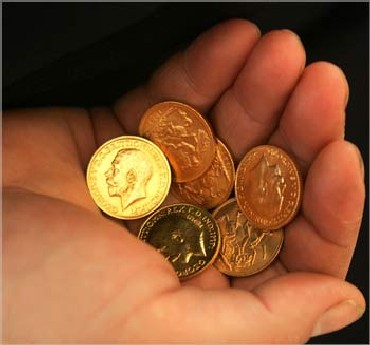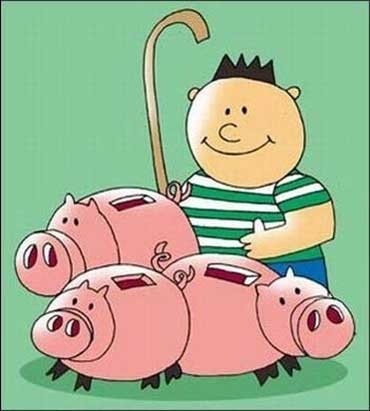Naveen Kumar
Have you ever felt an irresistible desire to go for an overseas vacation or give a precious gift to your loved one, but have been stopped in your tracks by the lack of funds?
Many a time, we let go of our aspirations because it seems difficult to achieve them at one go.
Often, people lose sight of small but important means to reach their goals when the goal appears to be too large.
Surinder Chawla, head, Retail Liabilities Product Group, HDFC Bank, said: "We all have to move towards regular savings because a lump sum is not available when we want it.
...
Recurring Deposit can help meet near-term goals
Image: All you need is some early planning and a saving discipline.Small and regular saving instruments, such as a recurring deposit, can help you achieve your near-term financial goals without too much pain.
All you need is some early planning and a saving discipline. Consider, for example, Noopur Sharma, a private sector bank employee, who wanted to gift a digital camera to her brother on his birthday.
She started a year in advance, with a Rs. 1,000 monthly RD and was able to gift her brother a camera just before his next birthday.
...
Recurring Deposit can help meet near-term goals
Image: It is vital to have regular savings.Why RD?
Remember, slow and steady wins the race. Suppose you wish to buy a house for Rs. 50 lakh and have a timeline of five years.
You may start with a monthly saving of Rs. 13,720 and you would have accumulated Rs. 10 lakh at 7.5 per cent a year interest during this period, taking care of the down payment (see Timing it Right).
...
Recurring Deposit can help meet near-term goals
Image: Investment in RDs will fetch you good returns.While the interest rate on a post office recurring deposit is stagnant-around 7.5 per cent-many banks are offering rates ranging between 8 per cent and 9 per cent for RDs with a maturity of 1-5 years.
An RD stands out as an option for achieving short-to-mid-term goals.
Jain said: "Equity or equity-based investments are suitable when you have a time-horizon of five years or more. For less than five years, one should use a mix of equity and debt (fixed income); depending on one's risk appetite. The nearer the financial goal, the more skewed your investment should be towards debt.
...
Recurring Deposit can help meet near-term goals
Image: RD will not give good returns to those in higher tax bracket.The tax story
Unlike fixed deposits, where banks deduct TDS (tax deducted on source) on the interest earned, there is no such deduction in the case of an RD.
The tax liability rests with the depositor on his overall annual income through all sources.
But as Jain says: "The biggest drawback of an RD is that if you are in a higher tax bracket, the post-tax returns won't be able to beat inflation."
...
Recurring Deposit can help meet near-term goals
Image: RD is the way to go for the risk-averse.So, if you don't fall under the highest tax bracket (30 per cent for an annual income above Rs. 8 lakh) and have short-to-mid term goals to be realised within five years, an RD is an attractive proposition.
Also, RD is the way to go for the risk-averse. This is because you would know how much to invest and what you would get on maturity.
...
Recurring Deposit can help meet near-term goals
Image: Before investing, do a proper analysis.So, before you decide on how much you want to invest in an RD, do a proper analysis of your income and expenditure.
If you have any surplus over and above that, you may invest it in other avenues.
Timing It Right
Identify your requirement and the time horizon.
Suppose, you plan to buy a car in the price range of Rs. 5 lakh-7 lakh three years down the line.
...
Recurring Deposit can help meet near-term goals
Image: Banks allow premature withdrawal of the RD.This you can do by opening a recurring deposit with Rs. 4,914 as monthly deposit. Here's how this instrument can help you achieve various goals.
Need money midway?
If you are in an urgent need of money midway, banks allow premature withdrawal of the RD.
However, you might lose out on the interest by 1-1.5 per cent.
A better option would be to take a loan or an overdraft against the balance of your RD.
...
Recurring Deposit can help meet near-term goals
Image: Plan early to avoid credit.It's a win-win option for you as, first, your RD keeps earning interest at the original rate and, second, you get a loan or an overdraft at a lower rate compared to other options, such as a personal loan.
Plan early to avoid credit.
If you use credit cards to meet unplanned expenses, you end up paying around 40 per cent interest a year if you pay the minimum amount due each month.
...
Recurring Deposit can help meet near-term goals
Image: RD not ideal product for those with fluctuating income."But using the credit card for various expenses and paying interest on them is a strict 'no'. Plan early and save money in your savings account or through an RD or a liquid MF."
The alternate way
For people with fluctuating income patterns, an RD may not be the ideal product.
Dalmia said: "Under an RD, there is a commitment every month to save money even if your budget doesn't allow you.
...
Recurring Deposit can help meet near-term goals
Image: In RD, there is penalty for missing payment."In an RD, if you miss a payment, you have to pay a penalty."
If you have an irregular income pattern, you may take a look at the bank sweep-out account, under which whenever you have surpluses above a prescribed level, the bank automatically books an FD of the surplus amount.
There are other saving options as well, such as the systematic investment plan from mutual funds, which might generate better returns, but come with a certain amount of equity risk, or are subject to debt market fluctuations.
Chawla said: "The choice depends upon the risk profile. Factors, such as age or other asset allocation, determine the ratio of RDs and SIPs in your portfolio."













article